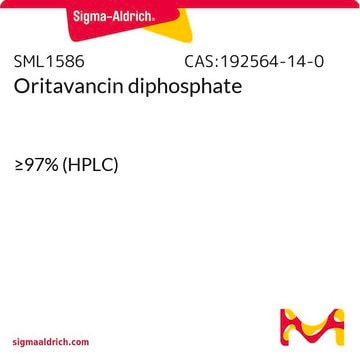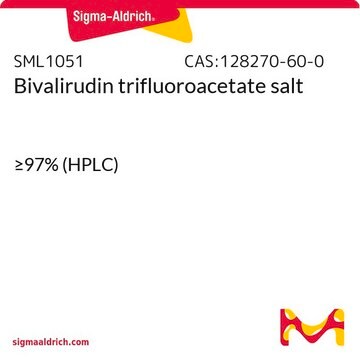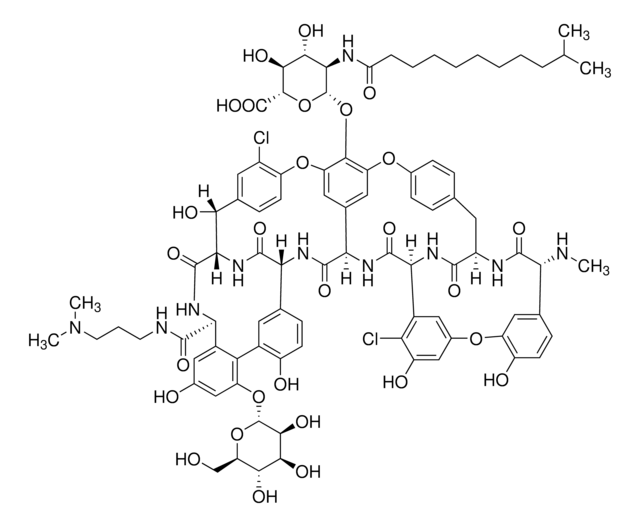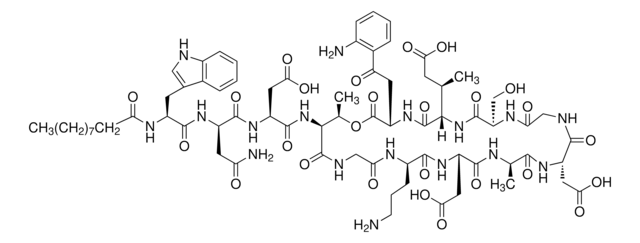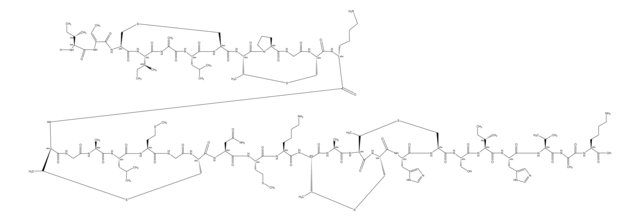R1781
Ramoplanin
Synonym(s):
A 16686, Antibiotic A 16686
About This Item
Recommended Products
Assay
≥75% (as ramoplanin A2)
Quality Level
form
powder
solubility
H2O: soluble 10 mg/mL
antibiotic activity spectrum
Gram-positive bacteria
Mode of action
cell wall synthesis | interferes
shipped in
dry ice
storage temp.
−20°C
InChI
1S/C106H170ClN21O30/c1-8-9-10-11-15-22-80(140)114-75(50-78(110)138)96(147)118-76(51-79(111)139)97(148)124-86(60-25-36-66(133)37-26-60)102(153)117-72(21-17-46-109)92(143)120-83(56(6)130)100(151)126-89(63-31-42-69(136)43-32-63)105(156)127-88(62-29-40-68(135)41-30-62)104(155)121-82(55(5)129)99(150)119-74(48-58-18-13-12-14-19-58)95(146)116-71(20-16-45-108)93(144)123-87(61-27-38-67(134)39-28-61)103(154)122-84(57(7)131)101(152)125-85(59-23-34-65(132)35-24-59)98(149)112-52-81(141)115-73(47-53(2)3)94(145)113-54(4)91(142)128-90(106(157)158)64-33-44-77(137)70(107)49-64/h10-15,18-19,22,53-57,59-77,82-90,129-137H,8-9,16-17,20-21,23-52,108-109H2,1-7H3,(H2,110,138)(H2,111,139)(H,112,149)(H,113,145)(H,114,140)(H,115,141)(H,116,146)(H,117,153)(H,118,147)(H,119,150)(H,120,143)(H,121,155)(H,122,154)(H,123,144)(H,124,148)(H,125,152)(H,126,151)(H,127,156)(H,128,142)(H,157,158)/b11-10-,22-15-/t54-,55+,56+,57+,59?,60?,61?,62?,63?,64?,65?,66?,67?,68?,69?,70?,71-,72-,73+,74+,75+,76?,77?,82+,83-,84+,85?,86-,87?,88-,89-,90?/m1/s1
InChI key
FSBZBQUUCNYWOK-YIOPJBSBSA-N
General description
Biochem/physiol Actions
Other Notes
Signal Word
Danger
Hazard Statements
Precautionary Statements
Hazard Classifications
Eye Dam. 1
Storage Class Code
11 - Combustible Solids
WGK
nwg
Flash Point(F)
Not applicable
Flash Point(C)
Not applicable
Personal Protective Equipment
Certificates of Analysis (COA)
Search for Certificates of Analysis (COA) by entering the products Lot/Batch Number. Lot and Batch Numbers can be found on a product’s label following the words ‘Lot’ or ‘Batch’.
Already Own This Product?
Find documentation for the products that you have recently purchased in the Document Library.
Customers Also Viewed
Our team of scientists has experience in all areas of research including Life Science, Material Science, Chemical Synthesis, Chromatography, Analytical and many others.
Contact Technical Service


